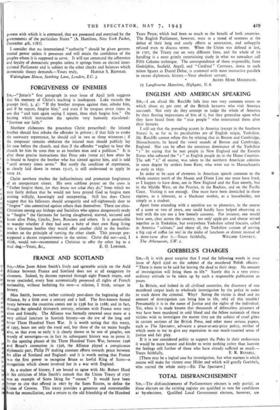FRANCE AND SCOTLAND
SIR,—Miss Janet Adam Smith's lively and agreeable article on the Auld Alliance between France and Scotland does not at all exaggerate its closeness. Indeed, by decrees repeated through eight French reigns, and never rescinded, every Scot automatically possessed all rights of French nationality, without forfeiting his own—a relation, I think, unique in history.
Miss Smith, however, rather curiously post-dates the beginning of the Alliance, by a little over a century and a half. The first-known formal treaty between the countries comes not in 1326 but in 1168; and in fact, through the splendid thirteenth century, relations with France were very close and friendly. The Alliance was formally renewed once more at a very critical juncture in Scottish history—on the eve of the long and bitter Three Hundred Years War. It is worth noting that this treaty, of 1295, bears not only the royal seal, but those of the six major burghs also, so that even so early it is clearly shown to be one of peoples, not merely of sovereigns—as in fact its subsequent history was to prove it. In the opening phases of the Three Hundred Years War, between 1296 and Bruce's coronation in 1306, the Alliance played a conspicuous diplomatic part, Philip IV making constant efforts towards peace between his allies of Scotland and England: and it is worth noting that France was the first power to recognise Bruce as lawful King of Scots—a recognition which almost involved her in a war with England.
As a student of history, I am bound to agree with Mr. Robert Hurd bis criticism of Miss Smith's remark that the Union Treaty of 1707 was an example of Scots liking for " reason." It would have been better to cite that offered in 16o7 by the Scots Estates, to define the Union of Crowns. This treaty provides a generous and statesmanlike basis for reconciliation, and a return to the old friendship of the Hundred Years Peace, which had been so much to the benefit of both countries. The English Parliament, however, were in a mood of soreness at the defeat of their long and costly efforts at annexation, and unhappily refused even to discuss terms. When the Union was defined at last, in 1707, the Treaty ran on very different lines, and the whole of its handling is a most grimly entertaining study in what we nowadays call Fifth Column technique. The correspondence of those responsible, from Godolphin, Seafield, Argyll, and "Cardinal " Carstares, down to such minor figures as Daniel Defoe, is crammed with most instructive parallels to recent diplomatic history.—Your obedient servant,


























 Previous page
Previous page